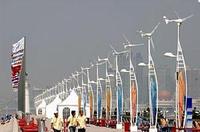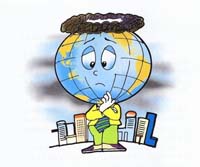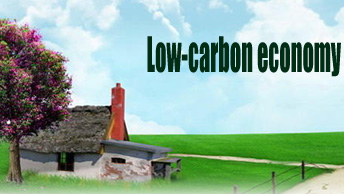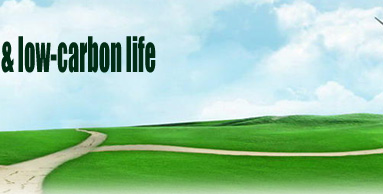| What’s the low-carbon economy? |
The low-carbon economy is to have a minimal consumption of high carbon energy such as coal and petroleum etc. and have a minimal output of greenhouse gas emissions into the biosphere by various methods of technology innovation, innovation system, industry transformation, and new energy development with the philosophy of sustainable development to achieve a mutual benefit in economic development pattern between the development of economic society and the ecological environment protection.
|
| The background |
With the use of biomass energy, wind energy, solar energy, hydro energy, fossil energy, and nuclear energy, human beings gradually moves towards agricultural civilization and industrial civilization from original civilization. As the rapid growth of global population and economic scale, people have realized the environmental problems caused by energy and its inducement. Not only the harm of smog, photochemical smog and acid rain, but also the carbon dioxide concentration in atmosphere which will change the global climate has been recognized as an indisputable fact. In this context, a range of new philosophies and new policies is emerged as times require such as “carbon footprint”, “low-carbon economy”, “low-carbon technology”, “low-carbon development”, “low-carbon lifestyle”, “low-carbon society”, “low-carbon city”, “low-carbon Earth” and so on. So the result of revolution in energy, economy and values may create a new way in order to move gradually towards ecological civilization that is to abandon the traditional growth model of the 20th century and directly apply technology innovation and innovation system of new century by low-carbon economic model and low-carbon lifestyle to achieve the sustainable development of society. As a wide social forefront economic philosophy, low-carbon economy has not a definition established by usage yet, which covers a wide range of industries and management areas. emerged as times require such as “carbon footprint”, “low-carbon economy”, “low-carbon technology”, “low-carbon development”, “low-carbon lifestyle”, “low-carbon society”, “low-carbon city”, “low-carbon Earth” and so on. So the result of revolution in energy, economy and values may create a new way in order to move gradually towards ecological civilization that is to abandon the traditional growth model of the 20th century and directly apply technology innovation and innovation system of new century by low-carbon economic model and low-carbon lifestyle to achieve the sustainable development of society. As a wide social forefront economic philosophy, low-carbon economy has not a definition established by usage yet, which covers a wide range of industries and management areas.
|
| The purpose of low-carbon economy |
The characteristics of a low-carbon economy are the goal to reduce greenhouse gas emissions and create low energy consumption and low pollution based economic development system, including low-carbon energy system, low-carbon technology, and low-carbon industrial system. The low-carbon energy system is to reduce carbon dioxide emissions by developing clean energy, including wind energy, solar energy, nuclear energy, geothermal energy and biomass energy instead of fossil energy such as coal and petroleum. The low-carbon technology includes technology of Integrated Gasification Combined Cycle (IGCC) and Carbon Capture and Storage (CSS) and so on. The low-carbon industrial system includes emission reduction from thermal power plants, new energy vehicles, energy saving buildings, Industrial energy conservation and emission reduction, recycling economy, resource recovery, environmental equipment, energy-saving materials and so on. The starting point for a low-carbon economy is to gather statistics carbon sources and carbon footprints. There are three important sources of carbon dioxide, which the main one is the emissions from the thermal power plants, accounting for 41% of the total volume; the fasted growing emissions is from automobile exhaust, accounting for 25% of the total volume; and the emissions from construction accounting for27% with the growing numbers of the houses increases steadily. energy saving buildings, Industrial energy conservation and emission reduction, recycling economy, resource recovery, environmental equipment, energy-saving materials and so on. The starting point for a low-carbon economy is to gather statistics carbon sources and carbon footprints. There are three important sources of carbon dioxide, which the main one is the emissions from the thermal power plants, accounting for 41% of the total volume; the fasted growing emissions is from automobile exhaust, accounting for 25% of the total volume; and the emissions from construction accounting for27% with the growing numbers of the houses increases steadily.
|
| Significance |
To develop the low-carbon economy, on the one hand, positively bear environmental responsibility to complete the requirements of the national energy conservation targets; on the other hand, is to adjust the economic structure, improve energy efficiency, develop new industries, and build an ecological civilization, which abandon the practical approach of development model with treatment after pollution, high-end products after low-end products, intensive economy after extensive economy in the past and is an inevitable choice to achieve mutual benefit between economic development and resource protection.
From: Baidu website
|
|


